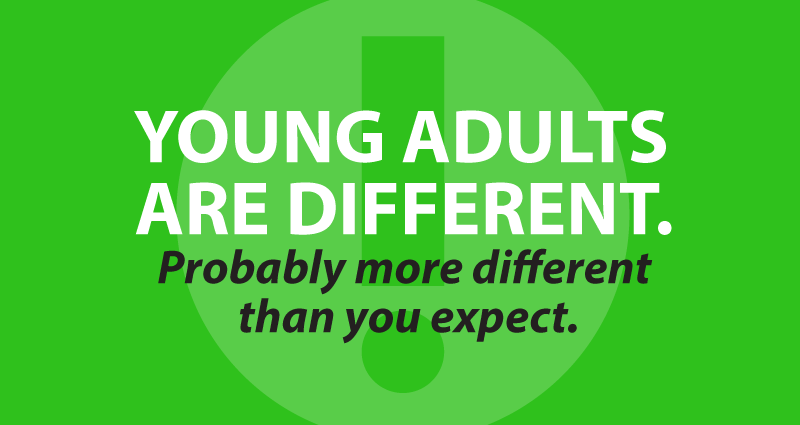
Those Crazy Kids
You’ve probably seen a few thousand articles about all the ways the internet and social media are going to change marketing forever. We are certainly facing a fundamental shift in marketing, but it’s not particularly tied to a certain technology — it’s tied more to some profound differences in generations.
Database marketing got its start in the late ’70s and became prevalent in the early ’80s, so the younger people now coming into economic power have been target marketed for their entire lives. People in this age group also grew up surrounded by cable TV, computers, and the internet, and many have had their own cell phone since they were kids. We can’t market like it’s 1950 any more.
Here are a few of the ways young adults are different — probably more different than you expect.
Young adults feel absolutely no obligation to you or your message.
This is an important point — where someone over 40 might open or at least glance at your message out of some quaint sense of obligation or politeness, a young adult will immediately mark it as spam or chuck it into the recycling bin, usually with no conscious recognition. They eagerly use ad blocking software, rip ads out of magazines before they read them, shovel most of their mailbox contents directly into the recycling bin, and skip commercials entirely.
Young adults have nearly infallible built-in ad filters.
In fact, there’s research that indicates they literally don’t even see things that look like advertising — for example, anything that blinks or is the shape of an ad or billboard might as well be blank.
Young adults instinctively understand that their attention is valuable.
You won’t get it for free.
They also understand that their information is also valuable.
You won’t get a real email or physical address without proving you’re trustworthy and providing significant value in return. If you have a roadblock in front of something they want, you will get the garbage input you deserve in return.
So what’s a marketer to do? If you’re flexible and respectful, there’s a bright side for credit unions:
Young adults still place the most value on authentic human connections and reputation.
These are two areas where credit unions can and should do very well. It’s also easy to mess this up — does your web site look and feel real, unique, trustworthy? Or is it just another corporate-looking clone of a bank site? Do you allow members to email you, and does a real human respond almost immediately?
The medium of contact means very little — the human on the other end is what matters.
Most young adults have close friends they’ve never seen in person. If you send an email, make sure it’s from a real person, and that it’s welcome and relevant. If you have a blog or use social networking, put a real person with a real personality in charge of it, and make sure they have the time available to do it right — otherwise, don’t bother.
Reputation is everything.
Understand and manage your reputation online and in personal contacts.
Honesty is part of reputation.
Again, credit unions can and should have a leg up in this area. Design (or revamp) your products and your marketing with an eye toward simplicity, authenticity, and value. If you’re hiding everything behind walls of fine print, you’re being dishonest.
There’s great value in being different.
This is something credit unions do very well day-to-day, but very few market the difference, or allow the personality of the credit union to come through on their web site.
Pay close attention to the way your web site, your home banking, mobile banking, and your other online services work, look, and feel.
Young adults will delve into your web site and research your reputation online before they ever consider opening an account. Does your web site do a good job of reflecting your credit union’s positioning, personality, and branding? Does your home banking look like a powerful financial portal or something tossed together by someone’s nephew ten years ago?
- Start Credit Unions to Save Credit Unions - November 7, 2024
- Five ways you’re scaring members away - October 29, 2024
- Five ways to make car loans interesting - October 8, 2024
